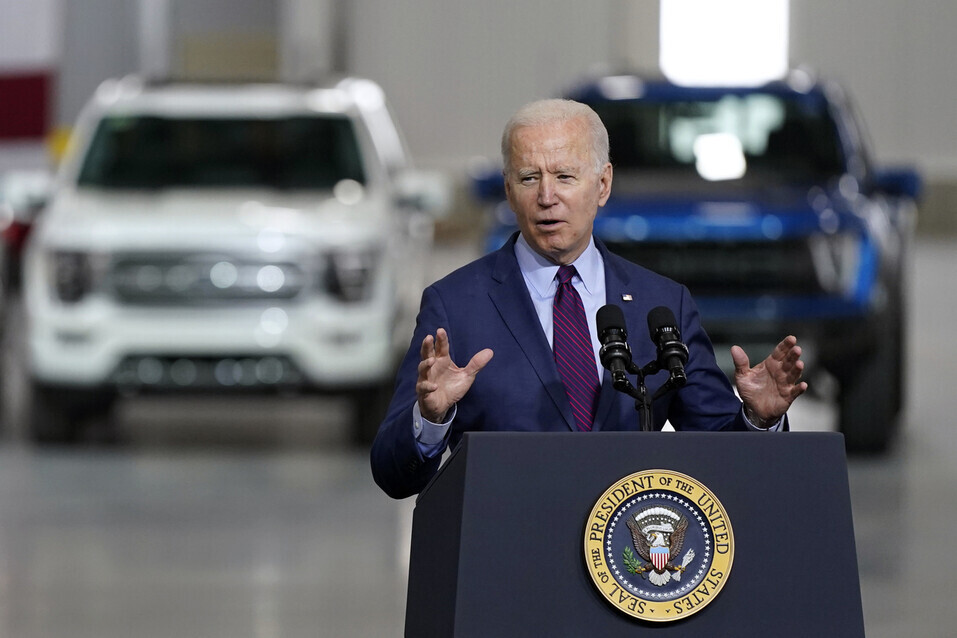
President Joe Biden of the US speaks during a visit to a Ford electric vehicle assembly line in Dearborn, Michigan, in May 2021. (Yonhap)
Reports say that US automaker Ford will soon be announcing plans to build a US$3.5 billion factory for electric vehicle batteries, challenging the assumption that South Korean battery manufacturers would have a monopoly in the US market because of the Inflation Reduction Act. Ford’s presumed partner is Contemporary Amperex Technology (CATL), a Chinese company and the world’s No. 1 battery manufacturer.
Ford is the first automaker to pursue a US project with a Chinese battery manufacturer since the Inflation Reduction Act took effect last year.
Citing anonymous sources, Reuters and other international media reported on Friday that Ford is about to announce the construction of a lithium iron phosphate battery plant worth US$3.5 billion with CATL. The factory would be located in Marshall, Michigan, and would create 2,500 jobs.
“We’ve said that we’re exploring batteries based on CATL’s technology for Ford vehicles and that we plan to localize [production in North America],” Ford told Bloomberg.
No further details have surfaced about the factory.
With aid from the Chinese government, CATL became the leader of the global battery market (in terms of capacity) in 2022, with a 37% share. That’s nearly three times the share of the No. 2 player, LG Energy Solution (13.6%).
CATL has also been accelerating efforts to expand into overseas markets by beginning operations at a factory in Germany last December.
The partnership at the new battery plant would likely give Ford complete ownership of the plant and its production equipment, while CATL handles the operations there. The two companies have avoided a joint venture, which would give both companies an ownership share, so as to reap the benefits of the Inflation Reduction Act.
China is listed as a “foreign entity of concern” in the Inflation Reduction Act, which means that Chinese battery manufacturers cannot receive subsidies even if they satisfy other requirements, such as producing their batteries locally in the US. Ford appears to have concluded that it can benefit from the subsidies as long as ownership and operations are kept separate.
Ford may also think that even without the subsidies, incentives from the state government could make its prices competitive. State governments can reward companies that create jobs, even when those companies’ activities are at cross purposes with federal government policies.
For example, Michigan has decided to give around US$715 million in incentives to Chinese-based battery company Gotion-High-Tech, which plans to build a battery materials factory in the state.
Experts advise caution about assuming that Korean battery manufacturers and material firms will be able to dominate the American market.
“The guidelines for the Inflation Reduction Act that the White House released last December say that major provisions are subject to change, so all provisions are up in the air until the final version, which is expected to drop at the end of March,” said Park Jae-beom, a senior analyst at the POSCO Research Institute.
“Given the legislation’s broad sweep and sharply conflicting interests, debate is expected to continue going forward as regulations are applied and subsidies disbursed. Domestic manufacturers also need to keep their guard up and follow developments closely.”
By Ahn Tae-ho, staff reporter
Please direct questions or comments to [
english@hani.co.kr]




